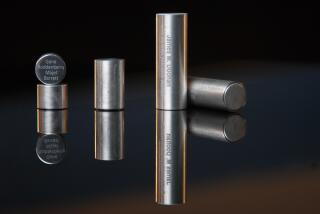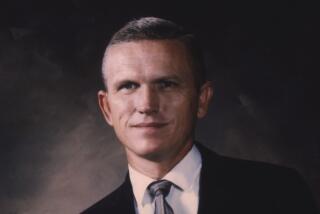Israel Bids Farewell to a Hero
- Share via
LOD AIR BASE, Israel — Standing side by side, the widow and teenage son of fallen astronaut Ilan Ramon blinked back tears and reached out to touch his flag-draped coffin. Israel’s first man in space had come home.
In the chill hangar of this military base, a solemn and diverse crowd of mourners -- former presidents and prime ministers, bearded rabbis and sweatshirt-clad high-school kids, uniformed soldiers young and old -- gathered Monday to hear eulogies to the 48-year-old Ramon, who died with his six American crewmates in the fiery disintegration of the space shuttle Columbia on Feb. 1.
He was remembered as a devoted father and the son of a Holocaust survivor, a skilled fighter pilot and a “real mensch,” as one of his former commanders put it, who had carried into space some of the Jewish state’s darkest memories and brightest hopes.
“We never imagined your homecoming would be like this,” said Prime Minister Ariel Sharon, clad in a dark suit and skullcap as he stood before the black crepe-covered bier. “Far up there, at the edge of the scope of human achievement, we could not have had a better and more fitting representative ... among the best of our sons and warriors.”
Dusk was turning to dark, with rain splattering down outside, when Ramon’s coffin, covered by the blue-and-white Israeli flag, was borne into the hangar by the eight pallbearers, all of them air force colonels like him.
The remains, and Ramon’s family, had arrived in Israel a few hours earlier on the Israeli carrier El Al, touching down at Ben-Gurion International Airport, which adjoins Lod Air Base.
Monday’s memorial was intended as the nation’s farewell to Ramon. A private funeral, with only family, close friends and military representatives, was to take place today at a northern Israeli farming community founded by Zionist pioneers, whose graveyard is the resting place of Israeli heroes, including legendary military commander Moshe Dayan.
Even in a country where violent death has become numbingly routine, the memorial, carried live on radio and television, brought a fresh outpouring of Israel’s familial and intimate brand of grief.
Many in the crowd wiped away tears as Ramon’s widow, Rona, and her 15-year-old son Assaf, the eldest of the couple’s four children, read an e-mail written by Ramon’s shipmate, David Brown, from aboard the Columbia. Assaf was wearing one of his father’s blue NASA flight jackets, with a Star of David arm patch.
In his e-mail to the family, Brown spoke of how moved he was as he read a letter Ramon had carried on the mission from a Holocaust survivor whose 7-year-old daughter was killed.
“ ‘I was stunned that such a beautiful planet could harbor such awful things,’ ” Assaf, who stood a little taller than his black-clad mother, read in English. She echoed his words in Hebrew, in a voice ragged with grief.
There was one small respite to wrenching sorrow: Enough of Ramon’s remains were found and identified to allow for a traditional Jewish burial.
Jewish tradition and religious law demand that a body be buried as much intact as possible -- an issue that has frequently come to the fore in the scores of bombing attacks in Israeli cities and towns since the start of the Palestinian uprising nearly 2 1/2 years ago.
On the Columbia, Ramon brought with him reminders of the Holocaust, which his mother and grandmother survived. He carried aboard a reproduction of a drawing by a 14-year-old boy who, unlike them, did not emerge from Auschwitz. Entitled “Moon Landscape,” it was an imagined view of the Earth from the moon.
Even before his status as Israel’s first astronaut made him a national hero, Ramon was part of an elite of fighter pilots. His most storied exploit has an eerie resonance today: He took part in Israel’s 1981 raid on an unfinished Iraqi nuclear reactor, a mission intended to contain Baghdad’s suspected atomic-weapons program.
At the memorial, the U.S. charge d’affaires in Israel, Richard LeBaron, led the American delegation; Ambassador Dan Kurtzer was in Washington. Several NASA officials and two former shuttle astronauts traveled to Israel for the ceremony.
Several of the speakers recounted how Ramon, upon seeing Jerusalem from aboard the shuttle, had recited Judaism’s most elemental prayer: “Hear, O Israel, the Lord is our God, the Lord is one.”
They recalled, too, how the 16-day voyage of the Columbia, with one of their own aboard, had served to lighten, if only a little, the dark national mood.
“When he was above, we remained here, bound to the ground of Israel’s difficult reality,” Defense Minister Shaul Mofaz told the mourners. “We will always remember the days of grace Ilan gave us.”
More to Read
Sign up for Essential California
The most important California stories and recommendations in your inbox every morning.
You may occasionally receive promotional content from the Los Angeles Times.













